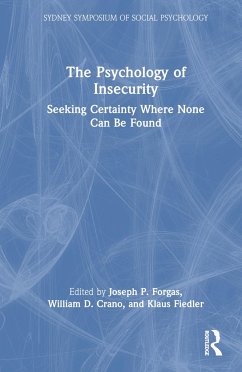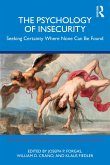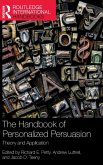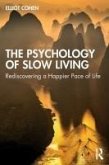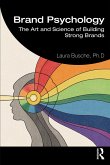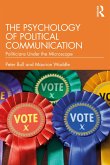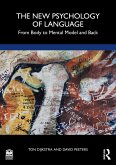The Psychology of Insecurity
Seeking Certainty Where None Can Be Found
Herausgeber: Forgas, Joseph P; Fiedler, Klaus; Crano, William D
The Psychology of Insecurity
Seeking Certainty Where None Can Be Found
Herausgeber: Forgas, Joseph P; Fiedler, Klaus; Crano, William D
- Gebundenes Buch
- Merkliste
- Auf die Merkliste
- Bewerten Bewerten
- Teilen
- Produkt teilen
- Produkterinnerung
- Produkterinnerung
This ground-breaking volume features contributions by leading international researchers exploring the social psychology of insecurity, and how existential, metaphysical and social uncertainty influence human social behaviour.
Andere Kunden interessierten sich auch für
![The Psychology of Insecurity The Psychology of Insecurity]() The Psychology of Insecurity49,99 €
The Psychology of Insecurity49,99 €![The Handbook of Personalized Persuasion The Handbook of Personalized Persuasion]() The Handbook of Personalized Persuasion287,99 €
The Handbook of Personalized Persuasion287,99 €![The Psychology of Slow Living The Psychology of Slow Living]() Elliot CohenThe Psychology of Slow Living55,99 €
Elliot CohenThe Psychology of Slow Living55,99 €![Brand Psychology Brand Psychology]() Laura BuscheBrand Psychology78,99 €
Laura BuscheBrand Psychology78,99 €![Posthuman Community Psychology Posthuman Community Psychology]() Michael RichardsPosthuman Community Psychology153,99 €
Michael RichardsPosthuman Community Psychology153,99 €![The Psychology of Political Communication The Psychology of Political Communication]() Peter BullThe Psychology of Political Communication39,99 €
Peter BullThe Psychology of Political Communication39,99 €![The New Psychology of Language The New Psychology of Language]() Ton DijkstraThe New Psychology of Language58,99 €
Ton DijkstraThe New Psychology of Language58,99 €-
-
-
This ground-breaking volume features contributions by leading international researchers exploring the social psychology of insecurity, and how existential, metaphysical and social uncertainty influence human social behaviour.
Hinweis: Dieser Artikel kann nur an eine deutsche Lieferadresse ausgeliefert werden.
Hinweis: Dieser Artikel kann nur an eine deutsche Lieferadresse ausgeliefert werden.
Produktdetails
- Produktdetails
- Sydney Symposium of Social Psychology
- Verlag: Taylor & Francis Ltd
- Seitenzahl: 392
- Erscheinungstermin: 23. Mai 2023
- Englisch
- Abmessung: 229mm x 152mm x 24mm
- Gewicht: 688g
- ISBN-13: 9781032329864
- ISBN-10: 1032329866
- Artikelnr.: 67402116
- Herstellerkennzeichnung
- Libri GmbH
- Europaallee 1
- 36244 Bad Hersfeld
- gpsr@libri.de
- Sydney Symposium of Social Psychology
- Verlag: Taylor & Francis Ltd
- Seitenzahl: 392
- Erscheinungstermin: 23. Mai 2023
- Englisch
- Abmessung: 229mm x 152mm x 24mm
- Gewicht: 688g
- ISBN-13: 9781032329864
- ISBN-10: 1032329866
- Artikelnr.: 67402116
- Herstellerkennzeichnung
- Libri GmbH
- Europaallee 1
- 36244 Bad Hersfeld
- gpsr@libri.de
Joseph P. Forgas is a Scientia Professor at the University of New South Wales. His research focuses on affective influences on social cognition and behaviour. For his work, he received the Order of Australia and the Distinguished Scientific Contribution Award, and he has been elected Fellow of the Australian and Hungarian Academies of Science. William D. Crano is Oskamp Professor of Psychology at Claremont Graduate University. He was Liaison Scientist for the US Office of Naval Research, NATO Senior Scientist, and Fulbright Senior Scholar. His research focuses on attitude development and attitude change and their applications. Klaus Fiedler is Professor of Psychology at the University of Heidelberg and Fellow of the German Academies of Science, the Association for Psychological Sciences, and the Society for Personality and Social Psychology. His research focuses on social cognition, language judgements, and decision-making. He received several awards, including the Leibniz Award, and he is on the editorial boards of leading journals.
Part 1: The Nature and Sources of Insecurity 1. Understanding the
Psychology of Insecurity: Evolutionary, Cognitive, and Cultural
Perspectives 2. The Evolution of Insecurity 3. The Interactive Role of
Death, Uncertainty, and the Loss of Shared Reality on Societal and
Individual Insecurity 4. The Uncertainty Challenge: Escape It, Embrace It
5. Insecurity Can Be Beneficial: Reflections on Adaptive Strategies for
Diverse Trade-off Settings Part II: Managing Individual Insecurity 6. The
Arc of Dissonance: From Drive to Uncertainty 7. Persuasion as a Sop to
Insecurity 8. Self-Handicapping in the Face of Uncertainty: The Paradox
That Most Certainly Is 9. Strategy, Trust, and Freedom in an Uncertain
World 10. Seeking Moral Meaning in Misfortune: Assigning Blame, Without
Regard for Causation Part III: The Role of Insecurity in Social
Relationships 11. Attachment Security and Coping with Existential Concerns:
Studying Security Dynamics in Dyadic, Group, Sociopolitical, and
Spiritual/Religious Relationships 12. Beyond Dyadic Interdependence:
Romantic Relationships in an Uncertain Social World 13. Adult Attachment
Insecurity During the COVID Pandemic: Heightened Insecurity and Its Undoing
14. Social Identity Dynamics in the Face of Overwhelming Uncertainty
15. From Individual Insecurity to Collective Security: The Group Survival
Motivation Part IV: The Role of Insecurity and Uncertainty in Politics and
Public Life 16. Trust in Social Institutions: The Role of Informational and
Personal Uncertainty 17. The Politics of Insecurity: How Uncertainty
Promotes Populism and Tribalism 18. Uncertainty, Academic Radicalization,
and the Erosion of Social Science Credibility 19. Escape from uncertainty:
To conspiracy theories and pseudoscience 20. Feelings of Insecurity as
Drivers of Anti-Establishment Sentiments
Psychology of Insecurity: Evolutionary, Cognitive, and Cultural
Perspectives 2. The Evolution of Insecurity 3. The Interactive Role of
Death, Uncertainty, and the Loss of Shared Reality on Societal and
Individual Insecurity 4. The Uncertainty Challenge: Escape It, Embrace It
5. Insecurity Can Be Beneficial: Reflections on Adaptive Strategies for
Diverse Trade-off Settings Part II: Managing Individual Insecurity 6. The
Arc of Dissonance: From Drive to Uncertainty 7. Persuasion as a Sop to
Insecurity 8. Self-Handicapping in the Face of Uncertainty: The Paradox
That Most Certainly Is 9. Strategy, Trust, and Freedom in an Uncertain
World 10. Seeking Moral Meaning in Misfortune: Assigning Blame, Without
Regard for Causation Part III: The Role of Insecurity in Social
Relationships 11. Attachment Security and Coping with Existential Concerns:
Studying Security Dynamics in Dyadic, Group, Sociopolitical, and
Spiritual/Religious Relationships 12. Beyond Dyadic Interdependence:
Romantic Relationships in an Uncertain Social World 13. Adult Attachment
Insecurity During the COVID Pandemic: Heightened Insecurity and Its Undoing
14. Social Identity Dynamics in the Face of Overwhelming Uncertainty
15. From Individual Insecurity to Collective Security: The Group Survival
Motivation Part IV: The Role of Insecurity and Uncertainty in Politics and
Public Life 16. Trust in Social Institutions: The Role of Informational and
Personal Uncertainty 17. The Politics of Insecurity: How Uncertainty
Promotes Populism and Tribalism 18. Uncertainty, Academic Radicalization,
and the Erosion of Social Science Credibility 19. Escape from uncertainty:
To conspiracy theories and pseudoscience 20. Feelings of Insecurity as
Drivers of Anti-Establishment Sentiments
Part 1: The Nature and Sources of Insecurity 1. Understanding the
Psychology of Insecurity: Evolutionary, Cognitive, and Cultural
Perspectives 2. The Evolution of Insecurity 3. The Interactive Role of
Death, Uncertainty, and the Loss of Shared Reality on Societal and
Individual Insecurity 4. The Uncertainty Challenge: Escape It, Embrace It
5. Insecurity Can Be Beneficial: Reflections on Adaptive Strategies for
Diverse Trade-off Settings Part II: Managing Individual Insecurity 6. The
Arc of Dissonance: From Drive to Uncertainty 7. Persuasion as a Sop to
Insecurity 8. Self-Handicapping in the Face of Uncertainty: The Paradox
That Most Certainly Is 9. Strategy, Trust, and Freedom in an Uncertain
World 10. Seeking Moral Meaning in Misfortune: Assigning Blame, Without
Regard for Causation Part III: The Role of Insecurity in Social
Relationships 11. Attachment Security and Coping with Existential Concerns:
Studying Security Dynamics in Dyadic, Group, Sociopolitical, and
Spiritual/Religious Relationships 12. Beyond Dyadic Interdependence:
Romantic Relationships in an Uncertain Social World 13. Adult Attachment
Insecurity During the COVID Pandemic: Heightened Insecurity and Its Undoing
14. Social Identity Dynamics in the Face of Overwhelming Uncertainty
15. From Individual Insecurity to Collective Security: The Group Survival
Motivation Part IV: The Role of Insecurity and Uncertainty in Politics and
Public Life 16. Trust in Social Institutions: The Role of Informational and
Personal Uncertainty 17. The Politics of Insecurity: How Uncertainty
Promotes Populism and Tribalism 18. Uncertainty, Academic Radicalization,
and the Erosion of Social Science Credibility 19. Escape from uncertainty:
To conspiracy theories and pseudoscience 20. Feelings of Insecurity as
Drivers of Anti-Establishment Sentiments
Psychology of Insecurity: Evolutionary, Cognitive, and Cultural
Perspectives 2. The Evolution of Insecurity 3. The Interactive Role of
Death, Uncertainty, and the Loss of Shared Reality on Societal and
Individual Insecurity 4. The Uncertainty Challenge: Escape It, Embrace It
5. Insecurity Can Be Beneficial: Reflections on Adaptive Strategies for
Diverse Trade-off Settings Part II: Managing Individual Insecurity 6. The
Arc of Dissonance: From Drive to Uncertainty 7. Persuasion as a Sop to
Insecurity 8. Self-Handicapping in the Face of Uncertainty: The Paradox
That Most Certainly Is 9. Strategy, Trust, and Freedom in an Uncertain
World 10. Seeking Moral Meaning in Misfortune: Assigning Blame, Without
Regard for Causation Part III: The Role of Insecurity in Social
Relationships 11. Attachment Security and Coping with Existential Concerns:
Studying Security Dynamics in Dyadic, Group, Sociopolitical, and
Spiritual/Religious Relationships 12. Beyond Dyadic Interdependence:
Romantic Relationships in an Uncertain Social World 13. Adult Attachment
Insecurity During the COVID Pandemic: Heightened Insecurity and Its Undoing
14. Social Identity Dynamics in the Face of Overwhelming Uncertainty
15. From Individual Insecurity to Collective Security: The Group Survival
Motivation Part IV: The Role of Insecurity and Uncertainty in Politics and
Public Life 16. Trust in Social Institutions: The Role of Informational and
Personal Uncertainty 17. The Politics of Insecurity: How Uncertainty
Promotes Populism and Tribalism 18. Uncertainty, Academic Radicalization,
and the Erosion of Social Science Credibility 19. Escape from uncertainty:
To conspiracy theories and pseudoscience 20. Feelings of Insecurity as
Drivers of Anti-Establishment Sentiments

